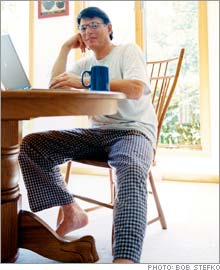Terry Taylor lost a job he loved only to realize he really wanted work for himself. Now he does.
NEW YORK (MONEY Magazine) - Some are born for self-employment. Others have it thrust upon them. And then there is 50-year-old Terry Taylor, who learned he was born for self-employment only after it was thrust upon him.
For 12 years Taylor had been general counsel of ClubCorp, a Dallas company that owns or manages 170 golf courses, clubs and resorts around the world. He was deeply devoted to ClubCorp founder Robert Dedman, who over the years had become a friend and mentor. Taylor would often work 80-hour weeks in a job that eventually expanded beyond the traditional role of a lawyer.
 |
| Accidental consultant: Working in pj's is nice, but what Terry Taylor loves about being solo is the extra family time. |
|
|
|
|
|
But when Dedman died in August 2002 and his son took over, Taylor's job was suddenly in jeopardy. Within two months he'd been demoted. Eight months later the ax fell.
Cushioned by a generous severance package -- nine months of his $225,000 salary plus extended health benefits -- he spent the summer, in his words, "adrift and grieving." He immersed himself in books about death, transition and change, and logged countless hours at the driving range before quitting golf cold-turkey.
When he finally started looking for a new job in the fall, Taylor just couldn't muster any enthusiasm about rejoining the corporate world. Compared with ClubCorp, other companies felt impersonal and cold, the work one-dimensional.
At one interview, his lassitude was so obvious that the prospective employer actually asked him point-blank if he was okay. "No," Taylor thought as he tried to compose himself. "I'm really not." Shortly after, he ended his job search for good.
Still unsure how he'd go on making a living, Taylor began volunteering his services to people who couldn't otherwise afford help. He put his undergraduate engineering degree to use rebuilding computers for members of his church; he did pro bono legal work for a community service project in West Dallas. Before long Taylor realized he loved the work he was doing, which was as challenging and varied as anything he'd ever done as a lawyer. With the end of his severance in sight, he recast himself as a consultant.
By the spring of 2004, Taylor had landed his first paying client: a local man who needed legal advice to buy a home remodeling business. He has since written an investor prospectus for a warehousing company, helped an inventor secure patent rights and financing for a new trash-compacting technology and done contract work for a local law firm, among other projects.
He believes in his clients as he believed in Dedman, and the personal connection is strong. "I'm in a unique position to do a lot of things they need done," he says. "If I don't help, their ideas might never see the light of day."
The financial transition hasn't been easy. Taylor brought in about $85,000 last year, which forced him to dip into savings for another $30,000 to cover expenses. This year he hopes to break even.
Meanwhile, Taylor, his wife Susan and their two teenage daughters have had to cut back. Recent vacations have been modest, impulse shopping is discouraged, and 15-year-old Allison won't get the Volkswagen Beetle she covets for her birthday. But the Taylors haven't had to tap their home equity or their retirement savings.
With the benefit of hindsight, Taylor says he should have saved more, and sooner, and should have taken time to nurture relationships outside of his company that might have helped smooth his transition.
But beyond that, he has no regrets. The lifestyle is an obvious bonus. He works from home, often barefoot and occasionally in pajamas, and he's available to take his daughters to school, attend their recitals and competitions, and help with homework crises.
Taylor now says the day Dedman Jr. fired him was one of the best of his life: "Whether he intended it or not, he gave me the joy and happiness I have now." 